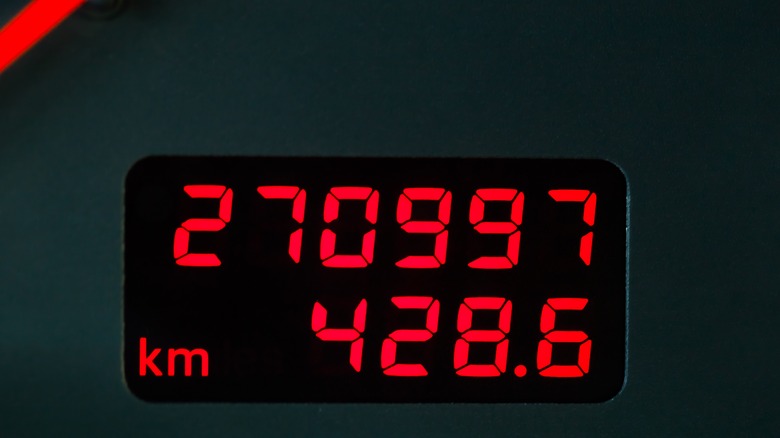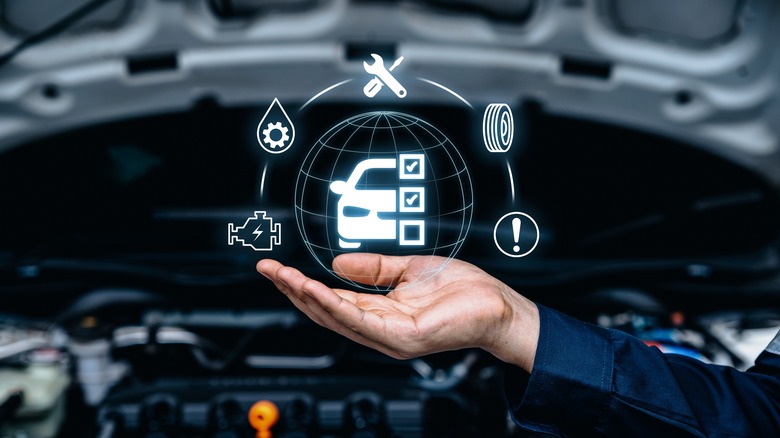Should You Buy Or Lease A Vehicle? Here Are The Pros And Cons
Buying a new car can be one of the most exciting times in a consumer's life. But it can also be one of the most stressful, as the financial investment is enough to set even the stodgiest of negotiators on edge. While there is little to be done about the stress of buying a car, research will make it easier to choose which vehicle is best suited to both your needs and your budget.
Regarding budget, that decision will likely impact your financial well-being for several years, depending on how you choose to purchase your desired vehicle. Research will also play a key role in how you approach the purchasing process, as the decision to lease your new car or buy it outright is not to be made lightly. While we cannot make that all-important decision for you, we can help you begin the research process by exploring some of the pros and cons of leasing or buying a new car. Let's have a look.
Leasing a car means you only drive it during its prime years
For many, leasing a car may be the best way to get behind the wheel of a new car. That's in no small part because spreading car payments out over several years may be more manageable than securing a loan or sorting out a lump sum payment out of pocket. Leasing may also make a lot more sense for folks who want to trade up to a newer model vehicle every year or two.
If you are part of the latter category, your desire to get behind the wheel of a new vehicle on the regular may have less to do with aesthetics than sheer practicality. After all, if you always find yourself driving a new car, that should limit the possibility of being confronted with the sort of breakdowns that can leave you staring down an expensive repair bill. Since leasing a vehicle from a dealership makes it relatively easy to trade up vehicles when the mood strikes, it also makes it easier for a driver to make sure they're always buckling themselves into a reliable automobile.
Leasing may limit how many miles you can drive
Once you're buckled into your new car and ready to hit the open road, you may need to take a little extra time to map out the shortest route from point A to point B. That's not entirely a matter of frugality if you choose to lease, as some agreements come with built-in language concerning how many miles you are allowed to put on the car during the length of the lease. Verbiage regarding mileage restrictions is relatively standard in lease agreements, even as many buyers are either unaware of what those restrictions are or what the penalties might be if the agreed-upon mileage is exceeded.
As with any leasing agreement, mileage caps can vary depending on the manufacturer, the dealership, and the vehicle. So do the penalties a driver may incur for exceeding the contracted mileage cap, with some fees being as much as 50 cents per mile for every mile in excess. At those rates, it's in your best interest to read your lease carefully so you fully understand any restrictions. If you're looking to negotiate a better deal on mileage, you'll want to be extra vigilant in your research.
Continuous leasing means monthly payments never end
On paper, lease agreements are the very definition of a "win-win" sort of deal between buyers and car dealers. After all, leasing gives consumers a chance to get behind the wheel of a late-model car they may not otherwise have been able to afford. A lease also ensures car dealers always have their newest model cars on the road, not to mention a continuous revenue stream.
Regarding revenue, leases can be lucrative for dealers as they make it easier for buyers to trade in for a new model vehicle every year or two, and each trade-up comes with a new lease. While that structure is ideal for car sellers who might prefer steady revenue over lump sum payments, it's hardly optimal for buyers, as continuing to renew a lease means their monthly payments may never actually stop.
For some buyers, that financial arrangement may be worth it if it keeps them driving the most recent make and model of a car. But it's safe to say most consumers would prefer those payments end as soon as possible. If you're one of them, it might be in your best interest to go the lease-to-own route with your car or even buy the vehicle outright at the point of purchase if you can afford it.
Buying a car gives you ultimate ownership privileges
There are, obviously, numerous other questions to ask when considering whether or not to lease your next vehicle. As you run down the leasing checklist, you might soon realize that you wouldn't need one if you were buying the car outright instead. Of course, the "buy it now" option may prove too costly for many as it requires that you have a large sum of cash on hand or the ability to secure a loan whose monthly payments may ultimately be higher than a lease. But if you manage to work out either of those financial feats, you'll no doubt revel in the carefree feeling you get when you drive your new car off the lot because it belongs to you and only you.
That level of freedom is far and away the biggest pro of buying a new car outright, as you won't have to worry about things like mileage restrictions, trade-in value, or endless monthly payments, and with those worries out of the way, driving your new car may never feel quite as satisfying.
Buying a car may limit warranty coverage and service plans
There is, of course, one major factor to consider when choosing to buy or lease a car, and that's the manufacturer's warranty. As leased vehicles tend to be covered by warranty for the duration of the agreement, it makes sense to opt for the peace of mind that comes with a cost-free, warranty-backed repair. Many leases even include free maintenance visits for the duration of the lease. In addition, many agreements also come with built-in language concerning damages incurred during the lease, so it's in your best interest not to skimp on upkeep.
Conversely, if you buy a used car, you likely won't have a manufacturer's warranty to lean on, meaning you're on the hook for all major repairs. While buying used may save you a few bucks on your monthly payment, it's a financial gamble some may not be comfortable with. Ultimately, deciding whether you want to buy or lease your new car will come down to a blend of your financial flexibility and the level of responsibility you're comfortable with. Only you can make those decisions, so be sure you have all your facts straight before you decide.





